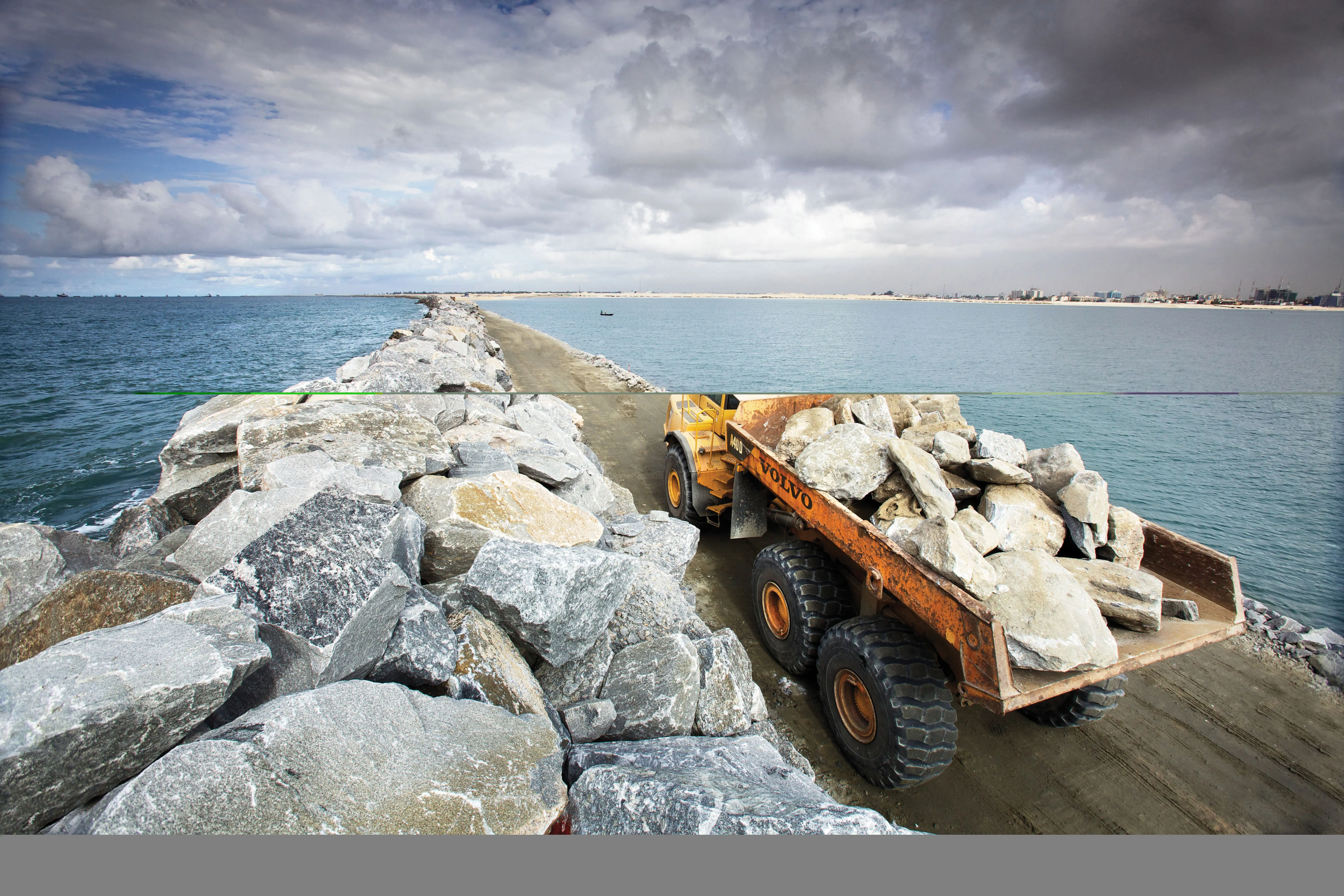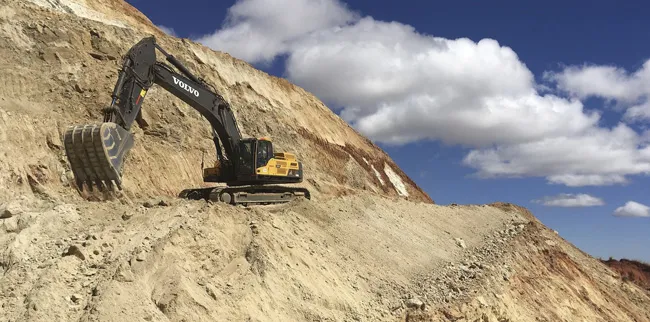Imagine a megapolis rising, Atlantis-like, from the sea. An urban development similar in size to New York’s Manhattan that boasts thriving business and residential districts to help transform not just a city but an entire country. It sounds like the stuff of science fiction. But the Eko Atlantic project in Lagos, Nigeria, is real and has become one of the most dazzling and most discussed construction developments in the entire world.
One hundred years ago, the area of land on which the new city will be bu
September 27, 2013
Read time: 5 mins

Imagine a megapolis rising, Atlantis-like, from the sea. An urban development similar in size to New York’s Manhattan that boasts thriving business and residential districts to help transform not just a city but an entire country. It sounds like the stuff of science fiction. But the Eko Atlantic project in Lagos, Nigeria, is real and has become one of the most dazzling and most discussed construction developments in the entire world.
One hundred years ago, the area of land on which the new city will be built was beach, but time and Mother Nature had erased all but a trace. The coastal erosion had become so serious that Victoria Island, a suburb of Lagos, was in danger of serious flooding, and it was feared that those who lived near the water’s edge would be forced to leave their homes. Steps were taken to protect the shoreline, but then a grander plan emerged: to reverse the erosion, reclaim 10km² of land and build a clean and eco-friendly city that would help ease the burden on Lagos, the biggest city in Africa’s fastest-growing economy, and offer employment and opportunity to its 17 million citizens.
Work began in 2006, dredging the first few thousand of what will eventually be approximately 140 million tonnes of sand, making it currently the biggest land reclamation site in the world.
Soon the foundations for the first buildings will be sunk, and by 2015 the skyline will start to change.
To ensure the Atlantic Ocean does not return for what it once stole, the developers have designed an 8km-long barrier to keep the sea at bay. This has become known as the Great Wall of Lagos and is being built on the same place as the water’s edge 100 years ago.
Each day for the past two years, a fleet of more than 150 vehicles, 50 of them2394 Volvo trucks, have driven the 161km return journey between the jobsite and a granite quarry at Ibadan from dawn to dusk to deliver 700,000tonnes of stone.
These are piled 15m high and topped with concrete accropodes, huge geometrical objects designed to resist waves on coastal structures.
The scale of the work is staggering. So much concrete is needed that the site has its own factory to produce it, and the project employs more than 1,200 staff directly linked to the construction of the project to operate and maintain the excavators, haulers and other machinery.
The biggest supplier of machines, with more than 40 on site and several more at the quarry digging and moving rocks, is Volvo.
At Eko Atlantic, there are excavators digging trenches for drainage and sewage; haulers moving rocks and sand, and a motor grader to maintain the roads on the site.
The operators and other staff have to work in searing heat, with temperatures often topping 40ºC. This can cause choking clouds of sand and dust, though a specially adapted A25 hauler fitted with a water tank helps dampen and cool the sand to prevent such build-ups. Then, in the rainy season, they have to work in lashing rain and torrential storms. It is tough work, but thanks to their efforts the shape of a new land has emerged where once there was water.
In April, the wall was almost 4,000m long, growing by 3m each day, and at its furthest point, where the road ends and the waves lash against the rocks, a sole EC460BLC Volvo excavator battles with nature, tasked with settling the stones that form the wall’s core.
The machine has carried out 5,400 hours of work in two years without any unplanned downtime.
“Where that machine works is a very difficult area. You have to deal with rocks, sand, salty water and salty air. All these factors create lots of damage to a machine. But with good support and a thorough maintenance schedule, that machine has coped,” says George Tawk, the group plant manager at Eko Atlantic.
“In Africa you need a customised, tropicalised engine that can handle the heat and the weather. Volvo machines have those engines. It is rough handling here. The machines have been supplied by the Volvo dealer in Nigeria, ATC-Nigeria.
“We use Volvo machines because in Africa, support is absolutely crucial, and I get that support from Volvo. When I need that support, wherever I might need it, I get it. Believe me, you can use the best machine in the world in Africa, but if you don’t have support then it doesn’t matter: you are nowhere. You need a dealer and a company that stands by you when you need them and gets you the parts that you need and the machines that you need, even in the remotest of places. Volvo and ATC-Nigeria give us that.”
“With Volvo’s help, the busy, cramped city of Lagos is getting a development of which it is rightly proud, a stunning new district that will provide work and housing for generations to come in this city on the sea.”
One hundred years ago, the area of land on which the new city will be built was beach, but time and Mother Nature had erased all but a trace. The coastal erosion had become so serious that Victoria Island, a suburb of Lagos, was in danger of serious flooding, and it was feared that those who lived near the water’s edge would be forced to leave their homes. Steps were taken to protect the shoreline, but then a grander plan emerged: to reverse the erosion, reclaim 10km² of land and build a clean and eco-friendly city that would help ease the burden on Lagos, the biggest city in Africa’s fastest-growing economy, and offer employment and opportunity to its 17 million citizens.
Work began in 2006, dredging the first few thousand of what will eventually be approximately 140 million tonnes of sand, making it currently the biggest land reclamation site in the world.
Soon the foundations for the first buildings will be sunk, and by 2015 the skyline will start to change.
To ensure the Atlantic Ocean does not return for what it once stole, the developers have designed an 8km-long barrier to keep the sea at bay. This has become known as the Great Wall of Lagos and is being built on the same place as the water’s edge 100 years ago.
Each day for the past two years, a fleet of more than 150 vehicles, 50 of them
These are piled 15m high and topped with concrete accropodes, huge geometrical objects designed to resist waves on coastal structures.
The scale of the work is staggering. So much concrete is needed that the site has its own factory to produce it, and the project employs more than 1,200 staff directly linked to the construction of the project to operate and maintain the excavators, haulers and other machinery.
The biggest supplier of machines, with more than 40 on site and several more at the quarry digging and moving rocks, is Volvo.
At Eko Atlantic, there are excavators digging trenches for drainage and sewage; haulers moving rocks and sand, and a motor grader to maintain the roads on the site.
The operators and other staff have to work in searing heat, with temperatures often topping 40ºC. This can cause choking clouds of sand and dust, though a specially adapted A25 hauler fitted with a water tank helps dampen and cool the sand to prevent such build-ups. Then, in the rainy season, they have to work in lashing rain and torrential storms. It is tough work, but thanks to their efforts the shape of a new land has emerged where once there was water.
In April, the wall was almost 4,000m long, growing by 3m each day, and at its furthest point, where the road ends and the waves lash against the rocks, a sole EC460BLC Volvo excavator battles with nature, tasked with settling the stones that form the wall’s core.
The machine has carried out 5,400 hours of work in two years without any unplanned downtime.
“Where that machine works is a very difficult area. You have to deal with rocks, sand, salty water and salty air. All these factors create lots of damage to a machine. But with good support and a thorough maintenance schedule, that machine has coped,” says George Tawk, the group plant manager at Eko Atlantic.
“In Africa you need a customised, tropicalised engine that can handle the heat and the weather. Volvo machines have those engines. It is rough handling here. The machines have been supplied by the Volvo dealer in Nigeria, ATC-Nigeria.
“We use Volvo machines because in Africa, support is absolutely crucial, and I get that support from Volvo. When I need that support, wherever I might need it, I get it. Believe me, you can use the best machine in the world in Africa, but if you don’t have support then it doesn’t matter: you are nowhere. You need a dealer and a company that stands by you when you need them and gets you the parts that you need and the machines that you need, even in the remotest of places. Volvo and ATC-Nigeria give us that.”
“With Volvo’s help, the busy, cramped city of Lagos is getting a development of which it is rightly proud, a stunning new district that will provide work and housing for generations to come in this city on the sea.”









